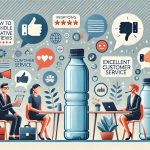When selling water bottles, ensuring product safety and quality is critical for building customer trust and ensuring compliance with regulations. Certifications serve as a proof that your products meet specific standards, offering both protection for consumers and credibility for your business. Among the most important certifications for water bottle manufacturers are BPA-Free certification, FDA approval, and ISO standards. These certifications demonstrate that your products are safe for use, sustainable, and produced in accordance with international best practices.
Understanding and obtaining these certifications can enhance your product’s marketability, reassure consumers about the safety of the products they’re purchasing, and increase your chances of standing out in a competitive market.
Importance of Certifications for Water Bottles
Why Certifications Matter in the Water Bottle Industry
Certifications are a way for manufacturers to communicate to consumers that their products have been tested and meet established safety, quality, and environmental standards. For water bottles, these certifications are crucial as they directly relate to public health and safety. Water bottles are often used on a daily basis, with many coming into direct contact with water, liquids, and food, so ensuring that they are safe for consumption is paramount.
Additionally, certifications help ensure that manufacturers follow ethical practices in sourcing, production, and distribution. These factors collectively contribute to a product’s reliability and safety.
For a water bottle business, obtaining key certifications can also differentiate your brand in a crowded market. In an era where consumers are increasingly concerned about sustainability, safety, and quality, certifications can instill trust and loyalty, ultimately enhancing the long-term success of your product.
The Common Types of Certifications for Water Bottles
Water bottles are subject to a variety of standards and certifications depending on the region they are sold in and the materials used in their production. Here are the key certifications that manufacturers should consider:
- BPA-Free Certification: Ensures that no bisphenol A (BPA) is present in the product.
- FDA Approval (U.S.): Ensures that the materials used in the product are safe for food and beverage contact.
- ISO Certification: Provides assurance that the product is manufactured in compliance with internationally recognized standards for quality management.
- NSF Certification: Focuses on the public health and safety of products that come into contact with food or beverages.
- LFGB Certification: The German standard for ensuring safety in materials that come into contact with food, often required for the European market.
Each of these certifications addresses a specific concern regarding water bottles, from chemical safety to manufacturing practices. Understanding their significance and how to obtain them will ensure that your product is not only safe but also meets the expectations of an increasingly informed consumer base.
BPA-Free Certification
What Is BPA and Why It Matters?
Bisphenol A (BPA) is a chemical compound commonly found in plastics and resins. BPA has been used in manufacturing polycarbonate plastics and epoxy resins, which are often found in products such as food containers, bottles, and water bottles. However, concerns about the potential health risks associated with BPA exposure have led to its scrutiny.
Studies have shown that BPA can leach into food or beverages when exposed to heat or prolonged use, potentially causing hormonal imbalances, developmental issues in children, and increased risks of certain diseases like cancer. Due to these health concerns, many countries have taken action to limit or ban BPA in food and beverage containers.
The BPA-Free certification assures consumers that the water bottles they are purchasing are free from this potentially harmful chemical.
How BPA-Free Certification Works
Manufacturers typically acquire the BPA-Free certification by using BPA-free materials such as Tritan™ copolyester, polypropylene, and polyethylene. These materials do not contain BPA and are regarded as safe alternatives for food and beverage containers. Certification typically involves:
- Material Testing: Independent third-party labs will test the water bottles or their components to ensure they do not contain any traces of BPA.
- Certification Documentation: Manufacturers are required to obtain certificates or reports that confirm their products meet BPA-Free standards.
The BPA-Free certification is not a single standard but rather an assurance that the product has been manufactured using safe materials. It is often accompanied by labels on the product or packaging to give consumers peace of mind.
Why BPA-Free Matters to Consumers
For many consumers, BPA-Free certification is a key consideration when purchasing a water bottle. In a market where sustainability and health are becoming increasingly important, the absence of BPA is a significant selling point. By obtaining BPA-Free certification, you not only ensure the safety of your products but also enhance their appeal to a health-conscious, environmentally aware customer base.
FDA Approval for Water Bottles
What FDA Approval Means for Water Bottles
The U.S. Food and Drug Administration (FDA) regulates products that come into contact with food and beverages to ensure they are safe for human use. In the case of water bottles, the FDA requires that manufacturers adhere to strict guidelines concerning the materials used in the production of their bottles.
FDA approval confirms that the water bottles meet the necessary safety standards for food and beverage contact. The FDA assesses various factors, including:
- Material Safety: The FDA evaluates the safety of the raw materials used in water bottles, such as plastics and metals, to ensure that they do not release harmful chemicals into the liquids they store.
- Chemical Migration Testing: The FDA conducts testing to ensure that chemicals used in the manufacturing process do not migrate into the contents of the bottle, potentially posing a health risk to consumers.
FDA approval is a rigorous process that involves testing, documentation, and compliance with safety standards.
How to Obtain FDA Approval
Obtaining FDA approval involves multiple steps:
- Material Evaluation: The first step is to ensure that the materials used in the water bottle (plastic, stainless steel, aluminum, etc.) comply with FDA regulations for food-grade products.
- Toxicological Testing: The FDA will assess the potential for harmful substances to leach into the beverage stored in the bottle. This includes migration testing for chemicals like phthalates, heavy metals, and other toxins.
- Manufacturing Compliance: The manufacturing process must adhere to Good Manufacturing Practices (GMP) to ensure consistency and quality.
- Labeling Compliance: The labeling on the product must include accurate, FDA-compliant information, including potential warnings or instructions for safe use.
After completing these steps, you can submit your products to the FDA for review. It is important to ensure that you have appropriate documentation to demonstrate that the product complies with the FDA’s standards for safety.
The Benefits of FDA Approval
FDA approval provides significant reassurance to both retailers and consumers that the product is safe for use. For businesses, it enhances product credibility and ensures compliance with U.S. regulations. For consumers, FDA approval means that the water bottle is safe for storing liquids, free from harmful chemicals, and suitable for regular use.
FDA-approved products are more likely to be stocked in retail stores and other distribution channels, as this certification is often required by major retailers and distributors. In addition, FDA approval gives your business a competitive edge in the marketplace.
ISO Certification for Water Bottles
What Is ISO Certification?
ISO (International Organization for Standardization) is a globally recognized body that sets standards for various industries, including manufacturing, quality management, and environmental practices. ISO certification provides a framework for businesses to follow in order to ensure that their products meet consistent quality, safety, and performance standards.
For water bottles, the most relevant ISO standards are:
- ISO 9001: The standard for quality management systems, ensuring that businesses meet customer and regulatory requirements while maintaining product quality.
- ISO 22000: Pertains to food safety management systems, which are critical for water bottles that come into contact with beverages.
Obtaining ISO certification demonstrates a commitment to quality, consistency, and adherence to international best practices.
The Process of Obtaining ISO Certification
Obtaining ISO certification for water bottles involves several steps:
- Quality Management System (QMS): To achieve ISO 9001 certification, manufacturers must develop and implement a QMS that ensures consistent product quality and continuous improvement.
- Food Safety Management System (FSMS): If your water bottles are intended for food and beverage use, implementing an FSMS compliant with ISO 22000 is essential.
- Internal Audits and Continuous Improvement: Manufacturers must conduct regular audits and reviews to ensure compliance with ISO standards. This includes monitoring processes for defects, quality control, and safety.
- Third-Party Evaluation: To become ISO certified, your business must undergo an evaluation by an accredited third-party auditor. This auditor will assess whether the manufacturer meets all ISO standards.
After successful audits, ISO certification will be awarded. ISO standards are recognized worldwide, and their implementation is crucial for any business looking to sell water bottles in international markets.
The Value of ISO Certification
ISO certification is highly valued by consumers, retailers, and regulatory bodies alike. It assures customers that your water bottles are produced according to globally recognized standards of quality and safety. Moreover, ISO certification helps optimize internal processes, reduce costs, and improve customer satisfaction, which can ultimately drive business growth.
For companies selling in multiple regions or internationally, ISO certification is essential for ensuring product acceptance and compliance in various markets.
NSF Certification for Water Bottles
What Is NSF Certification?
NSF International is an independent organization that provides certification for products and materials that meet public health and safety standards. NSF certification for water bottles ensures that they meet stringent safety and quality standards for materials in contact with food and beverages.
NSF’s certification process involves evaluating the materials used in the water bottles, testing for potential chemical contamination, and ensuring that the product meets health and safety regulations.
Why NSF Certification Matters
- Health and Safety Compliance: NSF certification ensures that the water bottles are free from harmful chemicals such as BPA, phthalates, and heavy metals, which could potentially leach into beverages.
- Public Trust: NSF certification offers consumers peace of mind that your water bottles have been tested for safety and meet public health standards. It is particularly important for products in direct contact with consumables.
NSF certification is particularly valuable for businesses that want to promote their water bottles as being safe, non-toxic, and reliable for everyday use. It is often required for water bottles sold through major retailers or in specific regions.
Conclusion
Certifications like BPA-Free, FDA Approval, ISO Certification, and NSF Certification are essential for water bottle manufacturers who want to ensure their products are safe, high-quality, and compliant with both local and international regulations. These certifications help build consumer trust, demonstrate commitment to safety, and enable businesses to thrive in a competitive market. Obtaining the right certifications can lead to enhanced brand credibility, wider distribution channels, and greater customer loyalty, ultimately ensuring the long-term success of your water bottle business.







